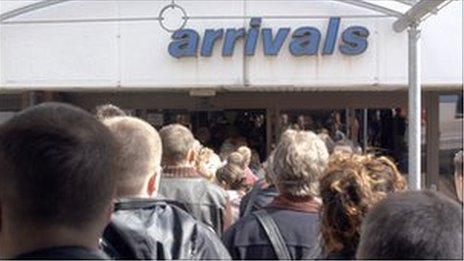Polls: No indication of huge Romanian-Bulgarian influx
- Published
Newsnight conducted polls in Romania and Bulgaria to test what impact the lifting of work restrictions might have on numbers intending to migrate.
Work restrictions expiring later this year for migrants from Romania and Bulgaria have had little impact on the numbers planning to move to the UK or wider EU, BBC Newsnight polls suggest.
The countries joined the EU in 2007 but many member states put limits on their citizens working which end this year.
This has raised concerns in the UK that many will now come to seek jobs.
But BBC surveys in each country, both of more than 1,000 people, suggest most would move only with a firm work offer.
Of those questioned more people intended to seek work in the EU including the UK in 2013 than in 2014.
A significant number said they would like to work in the UK, but the number making concrete plans was much smaller.
Romania and Bulgaria are among the poorest countries in Europe and when they joined the European Union in 2007 work restrictions were imposed amid fears about mass migration.
These measures will be dropped on 1 January 2014 giving Bulgarians and Romanians the same rights to work across the union as other EU citizens.
Some in the UK have voiced fears that ending restrictions will trigger a huge influx of Romanian and Bulgarian immigrants seeking work as happened when in 2004 the UK allowed people from European Union accession states including Poland, Hungary and the Czech Republic to work freely.
BBC Newsnight wanted to find out what impact these changes were likely to have, particularly on the numbers intending to come to Britain.
In February 2013 the programme commissioned a test poll, asking independent survey company Vitosha to question 1,000 people across Bulgaria.
People were asked if they intended to come to the UK to work. Over a quarter answered yes.
Analysts say the relatively high figure is unsurprising - times are tough in Bulgaria and many Bulgarians dream of a better life. In some surveys as many as 50% of Bulgarians have said they would like to work abroad, but over the past decade only about 6% have actually left.
BBC Newsnight then asked Vitosha in Bulgaria and Gallup Romania to design a questionnaire which would distinguish between aspiration and real concrete plans.
In March 2013 each of the agencies interviewed face to face more than 1,000 people representative of the country as a whole, in villages, in cities, in all regions of Romania and Bulgaria.
People were asked a range of questions about their current situation and whether they had any intentions to move elsewhere in the EU.
When asked whether in the past five years they had considered moving to live and work in another EU member state, 33% of the 1,101 Romanians polled said yes, 67% said no. Of the 1,014 people questioned in Bulgaria - 37% said yes, 63% said no.
Top destinations
When all of those polled were asked to pick their first choice of EU country to move to in either 2013 or 2014, 4.6% of Romanians and 9.3% of Bulgarians chose the UK. These numbers rose to 8.2% for Romanians and 13.6% for Bulgarians when they were asked directly about whether they would consider the UK as a destination.
In the past people from Romania and Bulgaria who have worked in other EU countries have usually opted for places they can reach by car or where the culture and language are closer to their own.

That was still the case among the 197 Romanians who said they were intending to work in another EU country in 2013 - 30% of them said they wanted to go to Italy, 24% to Germany, and 16% to the UK.
However, the Newsnight survey suggested that the UK is becoming a more attractive destination.
Concrete plans
When it came to Romanians intending to work in another EU country in 2014, a much smaller group of 73 people, the percentages changed - 25% wanted to go to Italy, 18% to Germany, and 26% to the UK.
Of the 242 Bulgarians who said they intended to work elsewhere in the EU in 2013 - 30% said they wanted to go to Germany, 27% to the UK and 10% to Spain.

As for Bulgarians intending to work elsewhere in the EU in 2014, again a smaller group, 123 people, 31% wanted to go to Germany, 24% to the UK and 12% to Spain.
Some people said one country for 2013 and a different one for 2014 - so they appear twice.
To get a clearer idea of how many people might actually come to the UK, those who had said they were planning to head to the UK were then asked whether they had made any concrete plans to move.
These plans included searching for somewhere to live and to work.
The number of positive responses fell significantly, though more Bulgarians than Romanians were making concrete plans.
Just 1.2% of the Bulgarians and 0.4% of the Romanians said they had begun to look for accommodation.
Estimations unsafe
The numbers were similarly small for those who had started looking for a job - 2.8% of the Bulgarians had started to look for a job with a recruitment agency and 0.3% of the Romanians.
And 1.4% of the Bulgarians and 0.7% of the Romanians had begun to look for work without the aid of a recruitment agency.
With such small numbers analysts say you cannot safely estimate real numbers of how many will come.
"I think if you're looking at who's making concrete plans, say who's spoken for instance to a recruitment consultancy or who has a firm job offer, I think yes the sample sizes there are a bit small to say specifically who are the numbers who are coming," Peter Flade, director of Gallup UK, told BBC Newsnight.
Many of the people who came to the UK from Poland and other eastern European countries did so without a job awaiting them. However, the results of the Newsnight surveys suggest that, for now at least, most Romanians and Bulgarians would only come to the UK with a firm offer of work.
Looking at Romania, of the 90 people who said they were planning to work in the UK, 65% would do so only with an offer from a recruitment agency, or directly from a company.
For the 138 Bulgarians answering this question, 60% said they would do so only with an offer from a recruitment agency, or directly from a company.
When looking at what kind of people are interested in moving to the UK, the Bulgarian survey suggested they tend to be younger and they are more likely to be unemployed than the average in the survey.

The Romanian survey suggested people interested in moving to the UK are more likely to have a university degree, more likely to be employed, and are likely to be more affluent than those looking to move elsewhere in the EU.
Benefits changes
The surveys were conducted before UK Prime Minister David Cameron made a speech in March suggesting restricting entitlements for new immigrants.
However, Newsnight asked whether the UK government considering restricting state benefits to Romanians and Bulgarians would affect their desire to come to the UK.
Although the 90 Romanian respondents who were interested in working in the UK were more professional and better off than the average respondent in the survey, just under half said it would affect their decision to a great or very great extent.
In Bulgaria, most people interested in working in the UK said a benefits change would not affect their decision.
Speaking to BBC Newsnight Bulgaria's Minister of Economy, Energy and Tourism Assen Vassilev said he did not think there would be a mass exodus of Bulgarians when the changes came into effect.
"I think people who wanted to leave have already left. Gone somewhere, come back, gone somewhere else come back. And going back to the survey that shows that 60-70% of people want a firm job offer. They know that going to a place that looks nice in pictures is not going to make your life better."
NB: When looking at the detailed tables that accompany these polls, it is important to look not just at the percentages, but at the total number of respondents who answer each question. At times this number will comprise the entire sample, a large figure that has been designed to reflect the views of the entire population. However, at other times, the number of people responding to individual questions may be as low as 20 and certainly fewer than 100. The margin of error increases significantly as the number of people answering any question diminishes.
- Published14 May 2014

- Published21 April 2013
